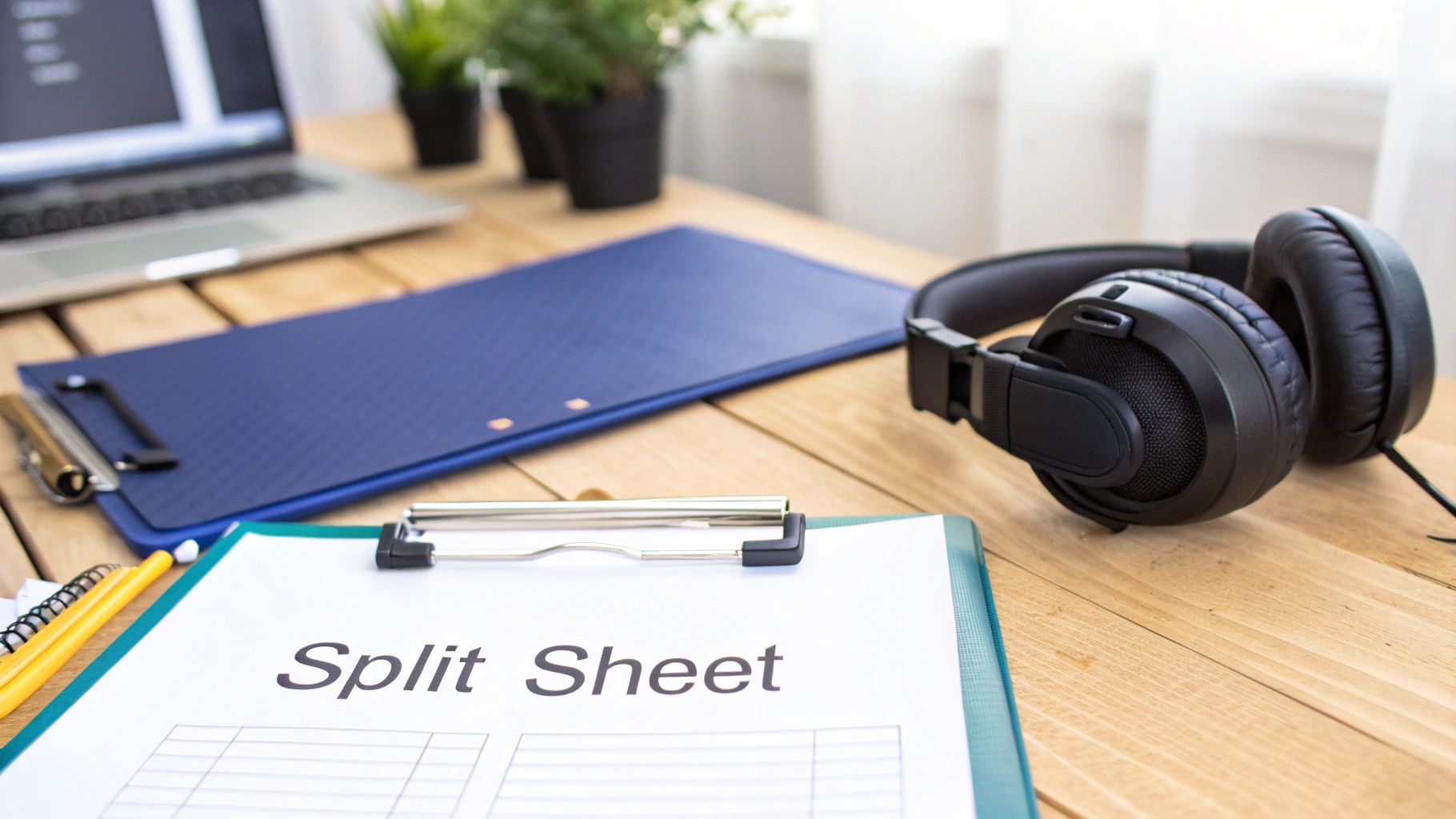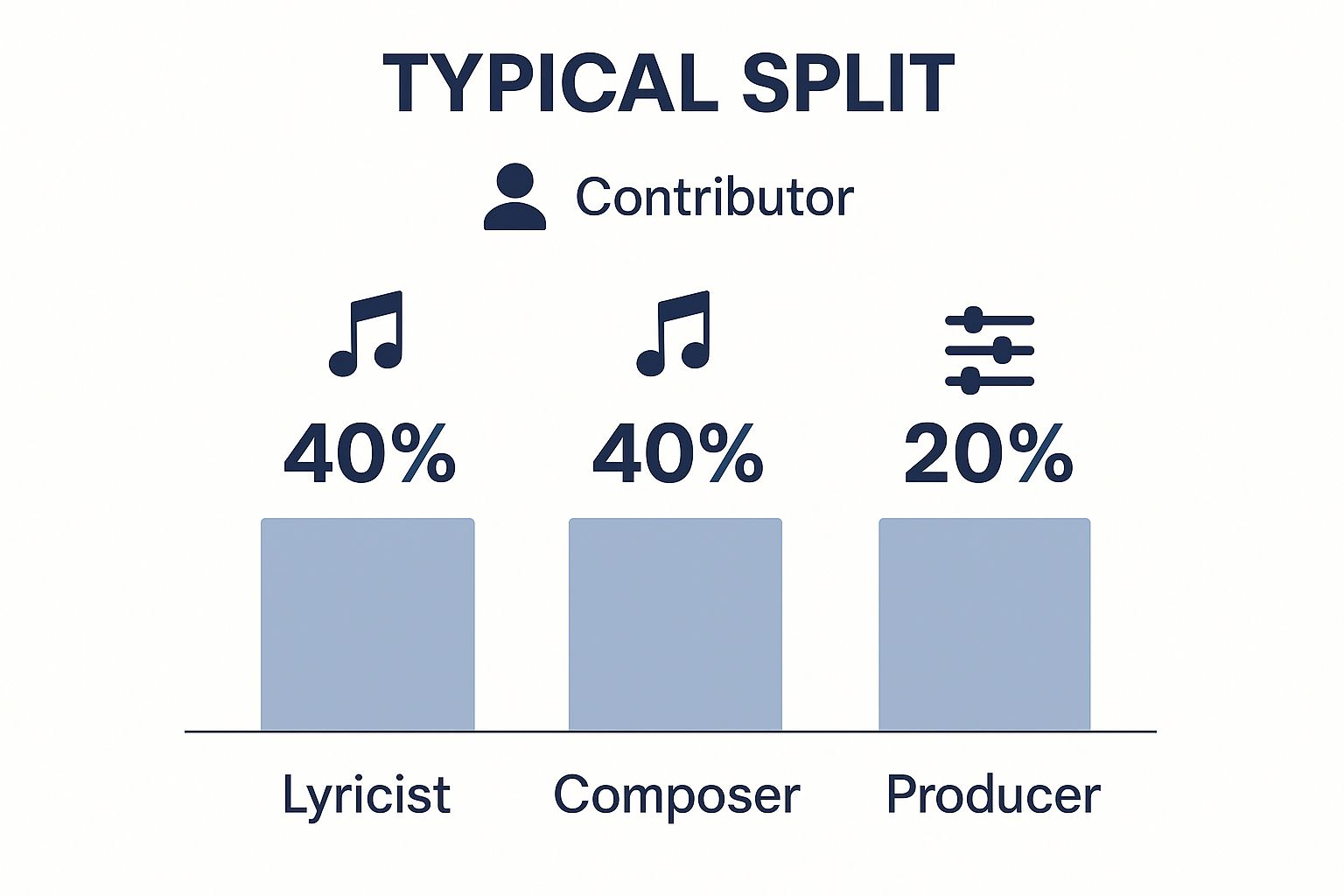The Real Deal About Songwriter Split Sheets

I've witnessed countless talented artists, producers, and writers lose out on their fair share because they neglected a crucial step: securing ownership before their track takes off. Let's talk about songwriter split sheets. They aren't glamorous, I know. Nobody dreams of paperwork when crafting a killer beat or a catchy hook. But trust me, these unassuming documents can be career-savers.
A songwriter split sheet outlines the percentage of ownership each contributor has in a song. Seems straightforward, right? Not always. Disputes often arise over who contributed what, especially when success and money enter the picture.
Why Bother?
Why all the legal fuss? It's about protecting your creative work. A songwriter split sheet is the foundation of music copyright ownership. Without one, you risk confusion, arguments, and resentment, especially when the royalties start flowing.
Speaking of money, songwriting often gets the short end of the stick in the streaming age. Performers and labels generally take about 80% of streaming royalties, leaving songwriters and publishers with the remaining 20%. This 20% is then divided according to your split sheet. Find more detailed statistics here. If your split sheet is incomplete or non-existent, your share shrinks or vanishes.
This Ain't Your Grandpa's Music Biz
Copyright law wasn't designed for modern music creation. It's outdated and doesn't account for collaborative songwriting. Without a split sheet, the law defaults to equal ownership. If four people contribute to a song, each gets 25%, regardless of their actual contribution.
This can lead to unfair outcomes. I've seen producers gain equal ownership with lyricists who spent weeks crafting verses, all because they added a few beats.
Split sheets are vital. They prevent ownership disputes from escalating into legal battles, especially in today's collaborative music scene. Don't wait for problems to arise. As an attorney, I'd rather see artists thrive than fight over scraps.
When Handshake Deals Go Horribly Wrong

I've witnessed firsthand how handshake deals can go south in the music industry. Talented artists and producers, individuals who pour their hearts and souls into their music, can see their potential earnings disappear because they relied on a verbal agreement. I understand the collaborative nature of music creation and the excitement of bringing something new into the world. However, when money enters the equation, a casual "we'll figure it out later" can quickly transform into a legal and financial nightmare.
The Default Disaster
Copyright law operates on default rules. These defaults often don't reflect the realities of modern music production. Without a songwriter split sheet, the law assumes everyone involved contributed equally. This means equal ownership and an equal share of the royalties.
This might sound fair in theory, but the practical application can be problematic. Imagine a collaboration involving four people: a lyricist, a composer, a producer, and an instrumentalist. Without a split sheet, each receives 25% of the royalties, regardless of their actual contribution. This simplified example highlights how default rules can misrepresent the division of labor in a collaborative project. In reality, contributions are rarely equal. This can create significant financial and legal complications.
In the absence of a formal songwriter split sheet, U.S. Copyright Law defaults to equal ownership among all contributors. This can lead to issues. For instance, if four individuals co-write a song without a signed split sheet, each is entitled to 25% of the royalties. This might not accurately reflect the actual creative input of each party. According to and various industry organizations, disputes stemming from unclear or missing split sheets are a primary cause of payment delays and legal conflicts in the music business.
Platforms, Payments, and Problems
What happens when a dispute occurs? Streaming platforms and digital distributors often freeze payments. Royalties become trapped in escrow until the ownership issues are resolved. This process can drag on for months, even years. It's agonizing to watch your earnings remain just out of reach while lawyers exchange emails.
Creative Collapse
The financial consequences are severe, but the emotional toll can be even worse. I've seen creative partnerships dissolve, friendships crumble, and bands break up over royalty disputes that a simple document could have prevented. Music should be about connection and shared passion. These disputes poison that creative energy.
Real-World Wreckage (A Quick Story)
I once represented a young rapper who collaborated with a more established producer. They had a verbal agreement for a 60/40 split, favoring the rapper. The track became a hit. Suddenly, the producer claimed he deserved a larger share, arguing he’d carried the production. Because there was no split sheet, they ended up in a bitter legal battle. They endured months of stress, thousands of dollars in legal fees, and a damaged creative relationship, all because they lacked a simple document. This scenario is all too common. Existing legal systems and laws often fail to reflect the intricacies of real-world collaboration.
The bottom line: songwriter split sheets are not just legal formalities. They are crucial tools for protecting your creative work, your financial future, and your artistic relationships. Don't wait to learn this lesson the hard way.
Building Bulletproof Songwriter Split Sheets

This infographic illustrates a standard royalty split among a lyricist, composer, and producer. It visually represents how the remaining 20% of streaming royalties allocated to publishers and songwriters gets divided. A common scenario might involve the lyricist and composer each receiving 40%, with the producer getting the remaining 20%.
Remember, these are just examples. The percentages should accurately reflect each individual's actual contribution. (We'll discuss this potentially uncomfortable conversation later.) For now, let's delve into the essential details.
More Than Just Filling In Blanks
A split sheet isn't a magic bullet. Simply having one doesn't automatically guarantee legal protection. I've encountered countless artists relying on generic templates, mistakenly believing they're fully covered, only to discover they've missed crucial elements. This oversight can lead to complex legal battles and financial losses. It's akin to building a house on sand – it might appear stable until a storm hits and causes everything to collapse.
A genuinely "bulletproof" split sheet demands more than just names and percentages. It requires specific details often overlooked in generic templates. It needs to be airtight and comprehensive.
The Must-Haves (and the Often-Forgotten)
- Song Information: This includes the title, any alternate titles, registration numbers (like those from your PRO registration, which is a separate process altogether), and the date of creation. This information is fundamental, yet surprisingly often incomplete, which can create problems later.
- Writer/Contributor Info: Ensure you include legal names (not stage names), addresses, phone numbers, email addresses, and, crucially, their performing rights organization (PRO) affiliation (such as ASCAP, , , etc.). Your PRO is how you receive royalties, making this information absolutely essential.
- Ownership Percentages: Be precise! Clearly define the breakdown by contribution. Did someone write the lyrics? Compose the melody? Create the beat? Arrange the music? Specify each contribution and its corresponding percentage. This clarity helps avoid ambiguity and potential disputes later.
- Publishing Information: Identify who owns the publishing rights. If anyone involved is affiliated with a publishing company, that information is vital.
- Signatures: Every single person involved must sign and date the split sheet. No exceptions. This legally binds everyone to the agreement, ensuring its validity.
Beyond the Basics: The Stuff That Really Matters
Here's where generic templates often fall short:
- Sample Clearances: If your song uses samples, you absolutely need written permission from the copyright holders. Failure to obtain clearance can lead to costly lawsuits. Specify the exact sample used and its percentage within the new song.
- Producer Points: Producers often receive a percentage of the songwriter's share (called "points"), in addition to their production fees. This arrangement needs to be explicitly stated, including the percentage and calculation method.
- Contributions by Section: This is a crucial detail. Did one person write the verse while another wrote the chorus? Detail each contributor’s input section by section. This granularity is crucial in resolving any disputes.
- Revisions/Amendments: How will future changes to the song be handled? Who has final approval? Outline these procedures clearly in writing to address potential disagreements as the song evolves.
This level of detail might seem excessive, but it's essential for preventing headaches and legal battles later. The music industry can be complex. A solid, detailed split sheet is your best protection. It safeguards your rights, maintains creative partnerships, and ensures you get paid.
To further illustrate the differences between basic and professional split sheets, take a look at the comparison table below:
Essential Split Sheet Elements Comparison:
A comparison of what basic templates include versus what professional split sheets require
| Element | Basic Templates | Professional Split Sheets | Why It Matters |
|---|---|---|---|
| Song Title | Included | Included | Essential for identification |
| Writer Names | Included | Included (Legal Names) | Legal names are crucial for contracts |
| Ownership Percentages | Included | Included (Detailed breakdown by contribution – lyrics, melody, beat, etc.) | Prevents ambiguity and disputes |
| PRO Affiliation | Sometimes included | Always included | Essential for royalty payments |
| Publishing Information | Rarely included | Always included | Protects publishing rights |
| Sample Clearances | Not included | Included (if applicable) | Prevents copyright infringement lawsuits |
| Producer Points | Not included | Included (if applicable) | Clearly defines producer compensation |
| Contributions by Section | Not included | Included | Provides granular detail for dispute resolution |
| Revisions/Amendments Process | Not included | Included | Addresses potential future disagreements |
| Signatures | Included | Included | Legally binds all parties |
This table highlights the critical differences between basic split sheet templates and the comprehensive documentation required for true protection. While basic templates cover the bare minimum, professional split sheets address the complexities of music creation and collaboration, minimizing risks and maximizing your chances of fair compensation.
Having The Money Talk Without Killing The Vibe

This is the part everyone dreads: discussing money. More specifically, talking about percentages after pouring your heart and soul into a creative project. It can feel uncomfortable, but avoiding this conversation is a recipe for disaster. I've seen enough artist disputes to know that neglecting this upfront discussion can lead to imploding bands, broken friendships, and significant royalty losses.
Timing Is Everything (Mostly)
So, when is the right time to bring up a songwriter split sheet? Ideally, before you even start writing. Before the first chord or lyric, get it out of the way. This might seem like a vibe killer, but it can prevent major headaches later.
Realistically, sometimes you get caught up in the creative process. If that happens, aim for a discussion before the song is finished and definitely before its release. Adjusting percentages on a demo is much simpler than altering them on a track climbing the charts.
Navigating the Negotiation (and the Awkwardness)
Let's face it, these conversations can be awkward. However, with the right approach, you can protect your interests and maintain your relationships.
Be transparent: Openly explain your reasoning for the proposed percentages. For example, "I wrote all the lyrics and the melody, so I'm suggesting a 70/30 split."
Listen actively: Truly understand your collaborators' perspectives, even if you disagree. Perhaps they crafted the killer hook, or perhaps their contribution is minimal, which warrants a different percentage.
Compromise (when necessary): Be willing to give and take. If you wrote the verses and your collaborator wrote the catchy chorus, consider a split that reflects those contributions.
Document everything: Once you reach an agreement, put it in writing. This is the most crucial step. Don't delay; create the split sheet immediately.
Dealing With Difficult Situations (Because They Will Happen)
The Unreasonable Demand: What if someone demands 80% for a single line? Politely but firmly push back, explaining your rationale. Be prepared to walk away if needed.
The Producer Power Play: Some producers expect writing credit and royalties even without contributing lyrics or melody. While common, this isn't always fair. If their contribution is purely technical, it warrants a separate fee, not songwriting royalties.
The Established Artist Imbalance: Negotiating with a more established artist can be intimidating. However, your contribution is valuable regardless of experience. Know your worth and negotiate fairly, even if it feels awkward.
Talking about money is crucial for protecting your music, relationships, and sanity. It's far less awkward than the potential conflicts that arise from avoiding the conversation. So, be prepared and get that split sheet signed.
Split Sheet Templates That Actually Work In Real Life
Let's be honest, most split sheet templates you find online are useless. They either lack crucial legal information or are so complicated that no one will actually use them. I've seen hundreds, maybe even thousands, of these things – they all blur together after a while. After wading through the mess, I've created templates that actually work. They protect you and are easy to use.
Different Strokes For Different Folks (Templates, That Is)
Collaborations come in all shapes and sizes. A quick jam session with a friend is different from a complex production with multiple artists and samples. My templates reflect this, covering everything from simple co-writes to more intricate scenarios. Each template includes the essentials while remaining straightforward. Because no one wants to spend hours deciphering a legal document when they're in a creative flow.
The Two-Person Jam: This basic template is perfect for co-writing with one other person. It includes straightforward percentages and clear contributor information – simple and efficient.
The Group Project: This template is designed for bands, songwriting teams, or any collaborative group. It allows for multiple contributors and different levels of input, offering more detail than the two-person template.
The Sample-Heavy Beat: If you work with samples, this is the template for you. It includes sections for clearing samples, a critical legal aspect that you don't want to ignore. It even has sections for specifying the percentage of the new work derived from the sample – a tricky but important detail that comes up frequently.
The Producer's Cut: This template addresses the often-confusing topic of producer points (the percentage of the songwriter’s share a producer receives). It clarifies exactly what the producer contributes and their corresponding percentage, preventing headaches down the road.
And because plans change, all my templates include sections for future revisions and amendments. Because let's face it, things always change.
Templates Aren't Everything (But They're a Good Start)
Having a template is a great first step, but knowing which template to use and how to adapt it to your specific situation is key. While I appreciate a good contract as much as the next lawyer, sometimes laws don’t quite match reality, especially in music. That’s why understanding the principles behind split sheets is just as important as the document itself, maybe even more so.
What if your collaboration doesn’t fit neatly into one of these categories? That’s where I can help. I can tailor these templates to your unique needs. Whether it's an unconventional collaboration, a complicated sample clearance, or navigating the gray areas of music copyright, I can guide you.
(I’m also working on a template for AI collaborations. Just kidding… mostly. But seriously, who owns the copyright when AI writes a song? Food for thought…)
To illustrate the different types of templates and their uses, take a look at the comparison table below:
Split Sheet Template Comparison: A breakdown of different split sheet templates and when to use each
| Template Type | Best For | Key Features | Limitations |
|---|---|---|---|
| Two-Person Jam | Co-writes with one other person | Straightforward percentages, clear contributor info | Not suitable for multiple contributors or complex scenarios |
| Group Project | Bands, songwriting teams, group projects | Multiple contributors, varying levels of input | May be overly complex for simple two-person collaborations |
| Sample-Heavy Beat | Productions using samples | Sections for sample clearance, percentage of work derived from sample | Requires careful consideration of sample clearance complexities |
| The Producer's Cut | Clarifying producer contributions | Specifies producer’s contribution and percentage (producer points) | May require adaptation for different producer roles |
This table summarizes the key features and limitations of each template, helping you choose the best one for your project. Remember, these templates are a starting point; understanding your specific needs is crucial for successful collaboration.
(Need help with a split sheet? Contact Cordero Law.) I’ve seen enough royalty disputes, and I'd rather help you prevent them than clean up the mess afterward. Trust me, it's cheaper and less stressful that way.
Digital Tools For Managing Music Rights
Look, I get it. Paper split sheets? Ancient history. Thankfully, we now have digital tools to manage these essential documents. This isn't a sponsored post – just my honest opinion. I'm looking out for you, not some company's profits.
Why Digital Beats Paper (Besides The Obvious)
Accessibility: Access your agreements from anywhere, at any time. No more digging through bags at 3 AM for that crumpled piece of paper!
Version Control: Keep track of every change and revision. No more confusion about which version is the "final" one, which is crucial if disputes arise.
Collaboration: Write and create splits in real-time. Some platforms even allow everyone to contribute and sign digitally, making those sometimes awkward money conversations a little less painful.
Integration: This is where it gets exciting. Some tools integrate with PROs (Performing Rights Organizations) and distributors, simplifying royalty collection. A real game-changer for artists. More on specific tools in a moment…
A Few Platforms Worth Checking Out (But Do Your Own Research Too)
: A popular choice, and I've seen quite a few clients using it. Straightforward, with a free version. The paid features, however, offer automated reminders, secure storage, and more.
: Clever name, and it focuses on speed and simplicity. Great for those impromptu studio sessions when the creativity is flowing. It's like a streamlined digital split sheet – nothing fancy, but sometimes simple is best.
: This platform is…intense. It goes beyond splits, offering copyright registration, collaboration agreements, and more. It feels more like a "legal" tool, which is valuable, but also has a steeper learning curve.
: This one stands out for its blockchain integration. Blockchain can be a complex subject, but the idea is that it makes your splits extra secure and tamper-proof. Definitely an interesting feature.
To streamline the documentation of your songwriting agreements, you can adapt: an .
(Side note: I've heard some PROs are developing their own split sheet platforms. Direct integration would be a major development, so keep an eye on that.)
Pricing (Because Nothing Is Free)
Most platforms offer free versions with limited features. Paid plans vary; some charge per song, others use monthly or annual subscriptions. Find what fits your budget and how often you collaborate.
Features, Features, Features (What to Look For)
| Feature | Why It Matters |
|---|---|
| Digital Signatures | Legally binding agreements. |
| Automated Reminders | No more chasing collaborators. |
| Cloud Storage | Access splits from anywhere. |
| Version History | Track changes and avoid confusion. |
| PRO Integration | Streamlined royalty payments. |
| Collaboration Tools | Real-time co-writing and creation. |
User Experience (Because Who Wants a Headache?)
This is key. A platform might look great but be a nightmare to use. Talk to other songwriters, get their feedback. The best platform is the one you'll actually use.
This section might be more detailed than others, but digital tools are constantly evolving. What’s great today might be outdated tomorrow. So, stay informed, ask questions, and protect your music.
Split Sheet Horror Stories (And How To Avoid Them)
Look, I could talk about the importance of split sheets all day long (and let's be honest, I probably will in other blog posts). But nothing illustrates the point quite like a real-world disaster. I've seen it all, from platinum hits where the true songwriter received no credit (and no money) to bands breaking up over royalty disputes that a single document could have prevented. The music industry is filled with talented individuals whose careers have been tragically impacted by paperwork problems.
The Ghostwriter's Lament
I once had a client, an incredibly talented songwriter, ghostwriting for a relatively famous artist. I can't reveal any names, of course, due to confidentiality. They had a verbal agreement, a casual "yeah man, we'll take care of you" sort of thing. Guess what happened? The song became a hit, the artist took all the credit, and my client received absolutely nothing. Zero. Not a single dime. All because there was no written agreement. It's a heartbreaking situation. We tried to fight it, but without a split sheet, it was nearly impossible.
The takeaway? Always get it in writing. Even if you're collaborating with your best friend, your grandmother, or someone you completely trust, a written agreement is crucial. Blind trust can lead to unfortunate consequences.
The Band That Broke Up Over a Beat
Then there was this indie band, four guys brimming with potential. They wrote an amazing track, got some radio airplay, and even attracted attention from a small record label. But they had never bothered with a split sheet. The drummer, who had created a fantastic beat, suddenly decided he deserved 75% of the royalties. The other members, who had written the lyrics, the melody, and, well, the rest of the song, understandably disagreed. The band imploded. Finished. A simple split sheet could have prevented the entire mess.
Lesson learned: Discuss splits early on, before success (and potentially greed) changes the dynamic. It's much easier to work things out over pizza and beer than in a courtroom filled with lawyers. Explore different to streamline royalty distribution once the split sheet is finalized.
The Producer's Missing Signature
This one is particularly painful. A producer, a friend of mine, worked on a track that went platinum. They had even filled out a split sheet and agreed on percentages. Everything seemed perfect. Except…the artist never signed it. The producer lost out on six figures. Six. Figures. All because of a missing signature.
Key takeaway: A split sheet is completely useless without signatures from every contributor. No exceptions.
I could share these stories all day (and I will, during your next consultation – give me a call!). These aren't just legal anecdotes; these are real people, real artists, and real losses. Don’t let yourself become another horror story. Protect your work. Protect your earnings. Get a split sheet. (And contact Cordero Law if you need assistance.) I’m here to help you navigate the legal complexities so you can focus on creating music.
